人教版八年级上册第九单元知识点全八上unit9知识点
八年级上人教版unit9知识点
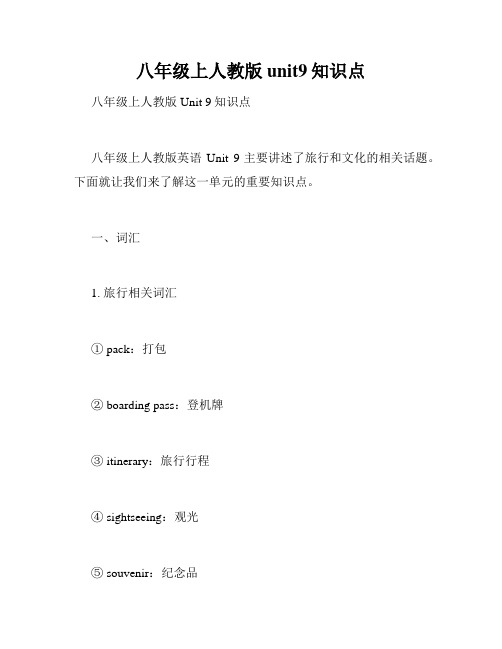
八年级上人教版unit9知识点八年级上人教版Unit 9知识点八年级上人教版英语Unit 9主要讲述了旅行和文化的相关话题。
下面就让我们来了解这一单元的重要知识点。
一、词汇1. 旅行相关词汇① pack:打包② boarding pass:登机牌③ itinerary:旅行行程④ sightseeing:观光⑤ souvenir:纪念品⑥ travel agency:旅行社⑦ tourist attraction:旅游胜地2. 语法1. 一般现在时旅行相关对话使用一般现在时,例如:① What do you usually pack when you travel?② What kind of souvenirs do you usually buy?2. 一般过去时旅行中出现的时间过去时使用一般过去时,包括:① went,took,saw,bought,visited等② What did you do last weekend?3. 现在进行时旅行计划中的动作通常使用现在进行时,例如:① I am packing my bags for the trip.② She is planning to visit Beijing next week.4. 现在完成时表示已经去过或者做过某事情,使用现在完成时,例如:① I have been to the Great Wall.② Have you ever tried the local food when you travel?5. 选择疑问句提出选择性质问题时使用选择疑问句,例如:① Do you prefer traveling alone or with a group?② Would you rather visit a big city or a small town?二、常用句型1. 问路句型Excuse me, how can I get to…?Can you tell me the way to…?Is it far from here to…?2. 寻找帮助句型Excuse me, could you help me?I wonder if you could tell me…Do you know where I can find…?3. 对话句型① What are you going to do this weekend?I am going to…/I am planning to…② Did you go anywhere special on your last vacation? Yes, I went to…/No, I didn't go anywhere special.三、文化知识在旅行中,我们还需要了解一些文化知识,这对于我们更好地了解当地的风俗习惯,与当地人交流有很大帮助。
人教版英语八年级上第九单元知识点

Unit 9 Can you come to my party?一、单词及短语1、prepare 动词意为使…做好准备,把…准备好;常用短语①prepare for……为…做准备;其名词形式是preparation 意为准备,准备工作Eg:I can’t go to your party ,because I must prepare for the math exam.The farmers are preparing the ground for planting。
农民们正在为种植准备耕地。
②prepare sb for/to do sth 使某人对……做好准备eg:The teachers are preparing the students for the final examination.老师们正让学生们准备期末考试.He took out a picec of paper and prepared to write to his friend.他拿出一张纸,准备给他的朋友写信。
③prepare sb sth 为某人准备……eg:the host prepared us a delicious meal.主人为我们准备了美味的晚餐.2、exam examination 名词意为考试常见的短语:entrance exam 入学考试pass the exam 通过考试fail the exam 考试及格have /take an exam 参加考试3、have the flu 患感冒have a cold 感冒了have a fever 发高烧have a headache 头痛注意:其中的have不是有的意思,通常意为患有……4、available 形容词意为有空的;可获得的,和free的意义相同be available===be freeEg:I am available (free)in this afternoon. 下午有空。
人教版八年级英语上册unit 9知识点归纳
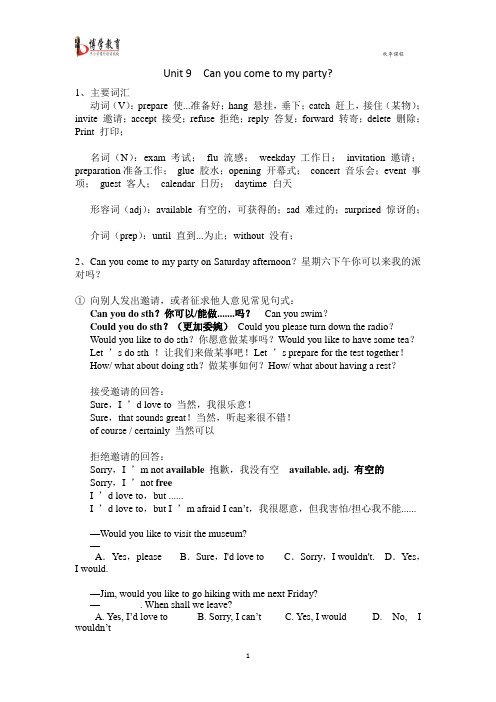
Unit 9 Can you come to my party?1、主要词汇动词(V):prepare 使...准备好;hang 悬挂,垂下;catch 赶上,接住(某物);invite 邀请;accept 接受;refuse 拒绝;reply 答复;forward 转寄;delete 删除;Print 打印;名词(N):exam考试;flu流感;weekday 工作日;invitation 邀请;preparation准备工作;glue 胶水;opening 开幕式;concert 音乐会;event 事项;guest 客人;calendar 日历;daytime 白天形容词(adj):available 有空的,可获得的;sad 难过的;surprised 惊讶的;介词(prep):until 直到...为止;without 没有;2、Can you come to my party on Saturday afternoon?星期六下午你可以来我的派对吗?①向别人发出邀请,或者征求他人意见常见句式:Can you do sth?你可以/能做.......吗?Can you swim?Could you do sth?(更加委婉)Could you please turn down the radio?Would you like to do sth?你愿意做某事吗?Would you like to have some tea?Let ’s do sth !让我们来做某事吧!Let ’s prepare for the test together!How/ what about doing sth?做某事如何?How/ what about having a rest?接受邀请的回答:Sure,I ’d love to 当然,我很乐意!Sure,that sounds great!当然,听起来很不错!of course / certainly 当然可以拒绝邀请的回答:Sorry,I ’m not available抱歉,我没有空available. adj. 有空的Sorry,I ’not freeI ’d love to,but ......I ’d love to,but I ’m afraid I can’t,我很愿意,但我害怕/担心我不能......—Would you like to visit the museum?—______A.Yes,please B.Sure,I'd love to C.Sorry,I wouldn't. D.Yes,I would.—Jim, would you like to go hiking with me next Friday?—________. When shall we leave?A. Yes, I’d love toB. Sorry, I can’tC. Yes, I wouldD. No, I wouldn’tTom______(can)come to my party because he is ill.②on Saturday afternoon在星期六下午在表示具体某天时,前面要用介词onOn weekend 在周末On Monday 在星期一On December 1st在12月1号On Wednesday morning/afternoon/evening 在周三早上/下午/晚上—My mother is ill.I have to look after her at home.—______.A.Thank you B.Oh,I don't know C.Bad luck D.I'm sorry to hear that3、prepare for an exam 为考试准备Prepare for... 为...而准备I can’t go with you because I have to prepare for the coming test我不能和你一起去,因为我必须得为即将到来的考试做准备Prepare sb for sth 使某人为某事做好了准备We must prepare ourselves for the meeting我们必须使我们自己为这次会议做好准备Prepare sth for sb 为某人准备好了某物Mom prepares a delicious meal for us 妈妈为我们准备了好吃的饭菜Prepare to do sth 准备做某事I prepare to take a trip in Taiwan 我准备去台湾旅游4、exam 是examination的缩写,意为“考试”Test ,也是“考试”的意思Take / have an exam 参加考试Pass the exam 通过考试/ 考试及格Fail the exam 考试不及格5、go to the doctor 去看医生6、Have the flu 患流感/感冒了Have的原意,“有”Have English class 上英语课Have breadfast 吃早餐Have a cold 感冒have a fever 发烧have a headache头痛Have a cough咳嗽have a sore throat喉咙痛have a toothache牙痛7、Sam isn’t leaving until next Wednesday 萨姆不会离开直到下周三为止萨姆下周三才会离开Until 直到......为止Not......until...... 不会做某事直到......为止直到......才......The noise didn’t stop until midnight 噪音直到午夜才停止She won’t forgive us until we say sorry to her 我们道歉前她是不会原谅我们的I waited until three o’clock 我们一直等到三点钟He lived with his parents until he got married 他结婚前一直和父母住在一起8、Can you hang out with us on Monday night?周一晚上你可以陪我们一起逛逛吗?Hang out with sb 和某人一起闲逛Hang out 闲逛/逛街He likes reading and he often hangs out in the bookstores他喜欢阅读所以经常在书店闲逛Hang,动词,“悬挂”,hang-hungHang the picture on the wall 把这幅画挂在墙上9、I’m afraid not 恐怕不能Afraid,形容词,意为“害怕的”否定时:I ’m afraid not 恐怕不能肯定时:I ’m afraid so 恐怕如此—Can you go to the concert?你能去听音乐会吗?—Sorry. I ’m afraid not 对不起,恐怕不能—Has she missed the bus?她错过公交了吗?—I ’m afraid so 恐怕如此/恐怕是这样没错10、invite,动词,意为“邀请”I nvite sb to sp,邀请某人到某地My pen pal invites me to his hometown 我笔友邀请我去他的家乡Invite sb to do sth,邀请某人做某事Mr.Kim invites us to have dinner with him 金先生邀请我们和他一起共用晚餐Invite(v)→invitation(n)邀请My best friend often invites me ______ delicious food.A.enjoy B.enjoying C.enjoyed D.to enjoy11、accept,动词,接受Accept的近义词是receive,但二者有所区别accept 与receive的区别:accept 意为“接受”指主观上原意接受receive 意为“收到”指客观上收到或拿到某样东西She accepted my apology她接受了我的道歉He received many letters from his family他收到很多来自家里的信件Receive letter from sb 收到某人的信I received his gift yesterday,but I wouldn’t like to accept it昨天我收到了他的礼物,但是我不想接受它12、refuse,动词,拒绝accept 的反义词Refuse sth 拒绝某物He rufused the invitation from Tony 他拒绝了Tony的邀请Refuse to do sth 拒绝做某事You should’t refuse to help her 你不应该拒绝帮助她13、the day before yesterday昨天(过去式)the day after tomorrow 后天(将来时)He went for Beijing the day before yesterday 他昨天去北京了Sarah will go for Beijing the day after tomorrow萨拉后天去北京—My father is coming back on Wednesday.—Oh, today is Monday, so you can see your father ______.A. todayB. the day before tomorrowC. tomorrowD. the day after tomorrow14、weekday 与weekendWeekday 工作日(周一至周五其中一天)Weekend周末(周六至周日)15、What ’s today?直译:今天是什么?引申:今天是什么日子?What ’s today?用来提问今天是几号、星期几。
人教版八年级上册英语Unit 9 知识点语法归纳总结
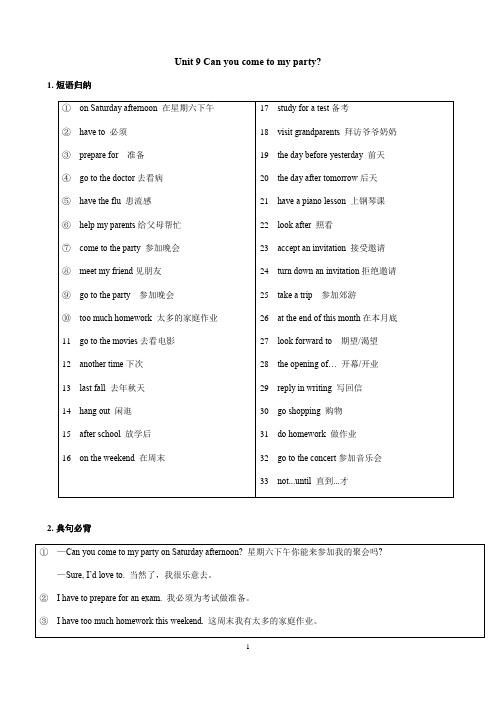
Unit 9 Can you come to my party?1.短语归纳2.典句必背3.用法集萃(1)—Can you come to my party on Saturday afternoon? 星期六下午你能来参加我的聚会吗?—Sure, I’d love to. 当然了,我很乐意去。
❖“Can you..?”可用来向别人发出邀请或询问对方能否做某事。
肯定答语是:Sure, I’d love to./Certainly./Of course, I can. 等。
否定答语常用:I’d love to, but I have to.../Sorry, I have to.../I’m sorry, I can’t. 等。
例:Can you go to the movies with me tonight? 今晚你能与我一起去看电影吗?Sure, I’d love to. 当然,我很乐意去。
(2)I have to prepare for an exam. 我必须为考试做准备。
❖prepare 意为“(为.....做准备;把....准备好”。
其用法如下:(3)I have too much homework this weekend. 这周末我有太多的家庭作业。
❖too much修饰不可数名词,用来强调其“量”超出了正常的范围。
too用来修饰形容词或副词,表示“太”的意思,其程度比very、so quite要强得多。
例:He sometimes finds his teacher leaves them too much homework to do.他有时发现老师留给他们做的家庭作业太多了。
I don’t want to eat too much food every day. 我不想每天吃太多的食物。
❖辨析(4)I remember we went bike riding together last fall when he visited you.我记得他去年秋天来拜访你的时候我们一起骑自行车兜风了。
人教版英语八年级上册Unit9 单元知识归纳总结
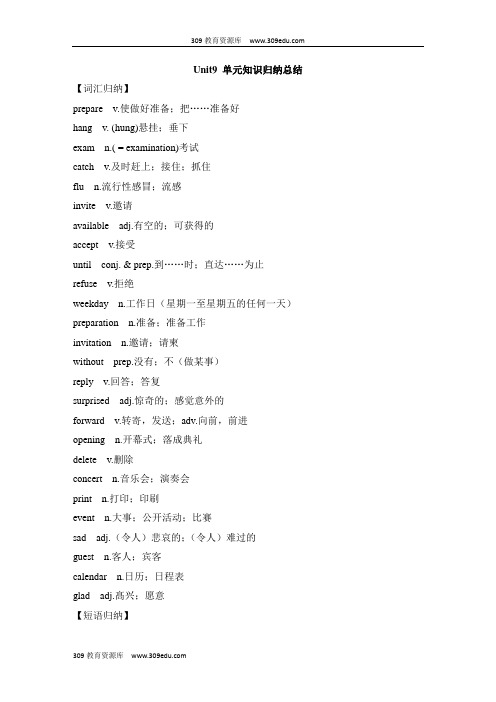
Unit9 单元知识归纳总结【词汇归纳】prepare v.使做好准备;把……准备好hang v. (hung)悬挂;垂下exam n.( = examination)考试catch v.及时赶上;接住;抓住flu n.流行性感冒;流感invite v.邀请available adj.有空的;可获得的accept v.接受until conj. & prep.到……时;直达……为止refuse v.拒绝weekday n.工作日(星期一至星期五的任何一天)preparation n.准备;准备工作invitation n.邀请;请柬without prep.没有;不(做某事)reply v.回答;答复surprised adj.惊奇的;感觉意外的forward v.转寄,发送;adv.向前,前进opening n.开幕式;落成典礼delete v.删除concert n.音乐会;演奏会print n.打印;印刷event n.大事;公开活动;比赛sad adj.(令人)悲哀的;(令人)难过的guest n.客人;宾客calendar n.日历;日程表glad adj.髙兴;愿意【短语归纳】prepare for为……做准备have the flu 患流感not... until 直到……才study for为……学习another time其他时间;别的go to the doctor 看医生hang out 闲逛;常去某处have to 必须,不得不the day before yesterday 前天reply to 回信the day after tomorrow 后天take a trip去旅行look after 照料;照顾go to a concert 去听音乐会look forward to 盼望;期待at the end of 在……结尾be sure 确信go shopping 去购物【典句必背】1.—Can you come to my party on Saturday afternoon?——星期六下午你能来参加我的聚会吗?—Sure, I’d love to.——当然了,我愿意去。
人教版初中英语八上unit9知识点
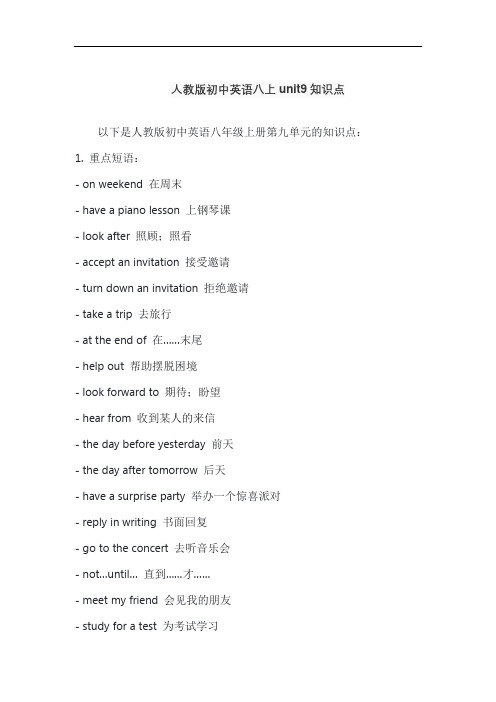
人教版初中英语八上unit9知识点以下是人教版初中英语八年级上册第九单元的知识点:1. 重点短语:- on weekend 在周末- have a piano lesson 上钢琴课- look after 照顾;照看- accept an invitation 接受邀请- turn down an invitation 拒绝邀请- take a trip 去旅行- at the end of 在……末尾- help out 帮助摆脱困境- look forward to 期待;盼望- hear from 收到某人的来信- the day before yesterday 前天- the day after tomorrow 后天- have a surprise party 举办一个惊喜派对- reply in writing 书面回复- go to the concert 去听音乐会- not…until… 直到……才……- meet my friend 会见我的朋友- study for a test 为考试学习2. 重点语法:- 用can 来表达邀请- Can you come to my party on Saturday?- Sure, I'd love to.- Sorry, I can't. I have to prepare for an exam.- 用must 来谈论职责和义务- I must finish my homework first.- I have to look after my sister.- 用might 来表示可能性- He might come to the party.- She might not be able to come.3. 重点句型:- Can you come to my party? 你能来参加我的聚会吗?- I'd love to, but I'm afraid I can't. 我很愿意,但恐怕不能。
人教版八年级上册英语Unit 9 知识点语法归纳总结

Unit 9 Can you come to my party?1.短语归纳2.典句必背3.用法集萃(1)—Can you come to my party on Saturday afternoon? 星期六下午你能来参加我的聚会吗?—Sure, I’d love to. 当然了,我很乐意去。
❖“Can you..?”可用来向别人发出邀请或询问对方能否做某事。
肯定答语是:Sure, I’d love to./Certainly./Of course, I can. 等。
否定答语常用:I’d love to, but I have to.../Sorry, I have to.../I’m sorry, I can’t. 等。
例:Can you go to the movies with me tonight? 今晚你能与我一起去看电影吗?Sure, I’d love to. 当然,我很乐意去。
(2)I have to prepare for an exam. 我必须为考试做准备。
❖prepare 意为“(为.....做准备;把....准备好”。
其用法如下:(3)I have too much homework this weekend. 这周末我有太多的家庭作业。
❖too much修饰不可数名词,用来强调其“量”超出了正常的范围。
too用来修饰形容词或副词,表示“太”的意思,其程度比very、so quite要强得多。
例:He sometimes finds his teacher leaves them too much homework to do.他有时发现老师留给他们做的家庭作业太多了。
I don’t want to eat too much food every day. 我不想每天吃太多的食物。
❖辨析(4)I remember we went bike riding together last fall when he visited you.我记得他去年秋天来拜访你的时候我们一起骑自行车兜风了。
人教版八年级英语上册Unit9知识点精讲
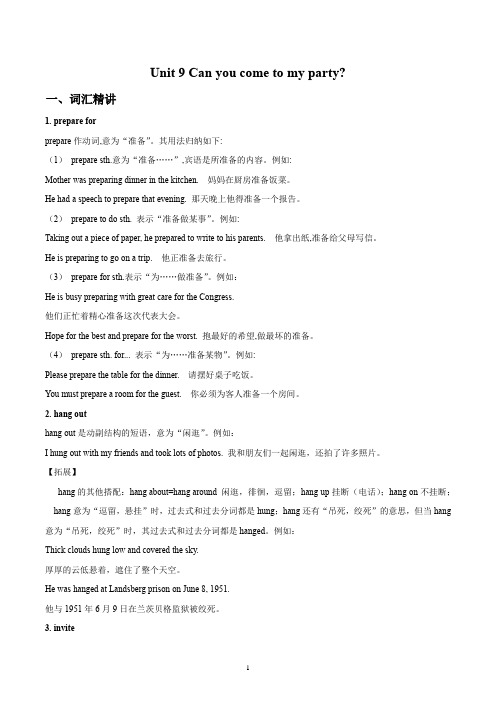
Unit 9 Can you come to my party?一、词汇精讲1. prepare forprepare作动词,意为“准备”。
其用法归纳如下:(1)prepare sth.意为“准备……”,宾语是所准备的内容。
例如:Mother was preparing dinner in the kitchen. 妈妈在厨房准备饭菜。
He had a speech to prepare that evening. 那天晚上他得准备一个报告。
(2)prepare to do sth. 表示“准备做某事”。
例如:Taking out a piece of paper, he prepared to write to his parents. 他拿出纸,准备给父母写信。
He is preparing to go on a trip. 他正准备去旅行。
(3)prepare for sth.表示“为……做准备”。
例如:He is busy preparing with great care for the Congress.他们正忙着精心准备这次代表大会。
Hope for the best and prepare for the worst. 抱最好的希望,做最坏的准备。
(4)prepare sth. for... 表示“为……准备某物”。
例如:Please prepare the table for the dinner. 请摆好桌子吃饭。
You must prepare a room for the guest. 你必须为客人准备一个房间。
2. hang outhang out是动副结构的短语,意为“闲逛”。
例如:I hung out with my friends and took lots of photos. 我和朋友们一起闲逛,还拍了许多照片。
【拓展】hang的其他搭配:hang about=hang around 闲逛,徘徊,逗留;hang up挂断(电话);hang on不挂断;hang意为“逗留,悬挂”时,过去式和过去分词都是hung;hang还有“吊死,绞死”的意思,但当hang 意为“吊死,绞死”时,其过去式和过去分词都是hanged。
人教版丨八年级上册英语9单元知识点梳理

人教版丨八年级上册英语9单元知识点梳理人教版丨八年级上册英语9单元知识点梳理Unit 9 When was he born?一、词组ping-pong player 乒乓球运动员too…to…太….而不能…a great Chinese ping-pong player 中国杰出的乒乓球运动员start hiccupping 开始打嗝write music 谱写曲子a movie star 电影明星learn to ride a bicycle 学会骑自行车start learning 开始学英语begin playing sports 开始进行体育运动a loving grandfather 慈爱的祖父a famous violinist 著名的小提琴手spend all one’s free time with sb. 与某人一起度过了所有的业余时间ice skating 滑冰a kind and loving grandmother 和蔼而慈爱的祖母a skating champion 滑冰冠军a small boy(girl) 孩提时期the famous Chinese pianist 中国著名的钢琴演奏家at the age of…在…年龄时take part in 参加、加入begin to learn the accordion 开始学习手风琴major in 主修,专修because of 因为、由于start for a place=leave for a place 动身去…二、词汇精讲1、be bornbe born意为“出生”,born是动词bear的过去分词,它与be 构成系表结构be born,常用在一般过去时,也可用于一般将来时中。
When was he born? 他是什么时候出生的?Another baby will be born next month. 另一个婴儿将于下个月出生。
人教版八年级上册英语-Unit-9单元知识点总结
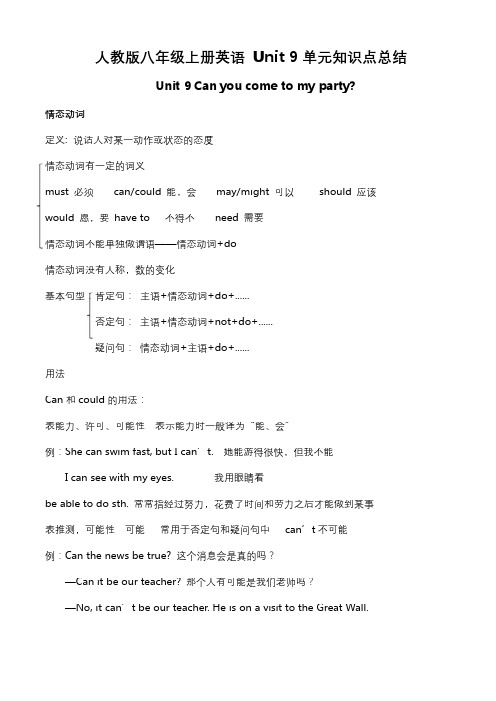
Unit 9 Can you come to my party? 情态动词定义: 说话人对某一动作或状态的态度情态动词有一定的词义must 必须can/could 能,会may/might 可以need 需要should 应该would 愿,要have to 不得不情态动词不能单独做谓语——情态动词+do情态动词没有人称,数的变化基本句型:肯定句:主语+情态动词+do+......否定句:主语+情态动词+not+do+......疑问句:情态动词+主语+do+......用法Can 和 could 的用法:表能力、许可、可能性表示能力时一般译为“能、会”例:She can swim fast, but I can’t.她能游得很快,但我不能I can see with my eyes. 我用眼睛看be able to do sth. 常常指经过努力,花费了时间和劳力之后才能做到某事表推测,可能性可能常用于否定句和疑问句中can’t不可能例:Can the news be true? 这个消息会是真的吗?—Can it be our teacher? 那个人有可能是我们老师吗?—No, it can’t be our teacher. He is on a visit to the Great Wall.could 在疑问句中,表示委婉的语气,此时could 没有过去式的意思例:—Could I use your pen? 我能用一下你的钢笔吗?—Yes, you can.可以(用 could 问,不能用 could 答。
)may 和 might 的用法表请求、许可,比 can 正式例:May I borrow your bike? 我可以借你的自行车吗?You may go home now. 现在你可以回家了表推测,谈论可能性可能,或许一般用于肯定句中may not 翻译为“可能不”例:It may rain tomorrow. 明天可能会下雨She may be at home. 她可能在家呢may 的过去式为 might ,表示推测时。
八年级上人教unit9知识点
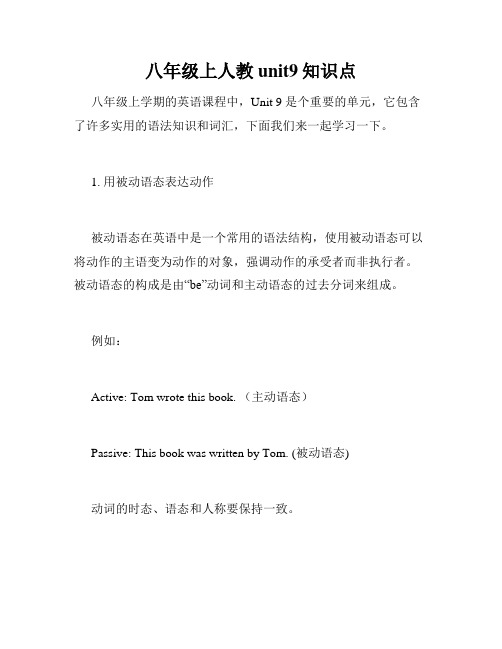
八年级上人教unit9知识点八年级上学期的英语课程中,Unit 9 是个重要的单元,它包含了许多实用的语法知识和词汇,下面我们来一起学习一下。
1. 用被动语态表达动作被动语态在英语中是一个常用的语法结构,使用被动语态可以将动作的主语变为动作的对象,强调动作的承受者而非执行者。
被动语态的构成是由“be”动词和主动语态的过去分词来组成。
例如:Active: Tom wrote this book. (主动语态)Passive: This book was written by Tom. (被动语态)动词的时态、语态和人称要保持一致。
被动语态可以用于各种类型的句子中,如陈述句、疑问句、祈使句等。
2. 用情态动词表达建议和推测情态动词在英语中是表示情态和语气的动词,可以用于表达建议、命令、愿望、推测等等。
建议:should / ought to / had better例如:You should / ought to study harder if you want to get into a good college.你如果想进好大学,应该更努力学习。
You had better not be late for the party tonight.今晚出去玩不能迟到。
推测:might / may / could例如:He might / may / could be at home. 我猜他可能在家。
She might / may / could have lost her phone. 她可能把手机弄丢了。
情态动词也可以用于否定句和疑问句中。
3. 介词短语的用法介词是一个关键词汇,用于表示事物之间的关系,如时间、地点、方向、方式、材料等。
介词短语对于英语语句的完整性和准确性起着非常重要的作用。
例如:He is sitting at the desk. 他坐在桌子旁边。
They are going to the cinema. 他们去电影院。
最全面人教版八年级上册英语第九单元知识点归纳总结
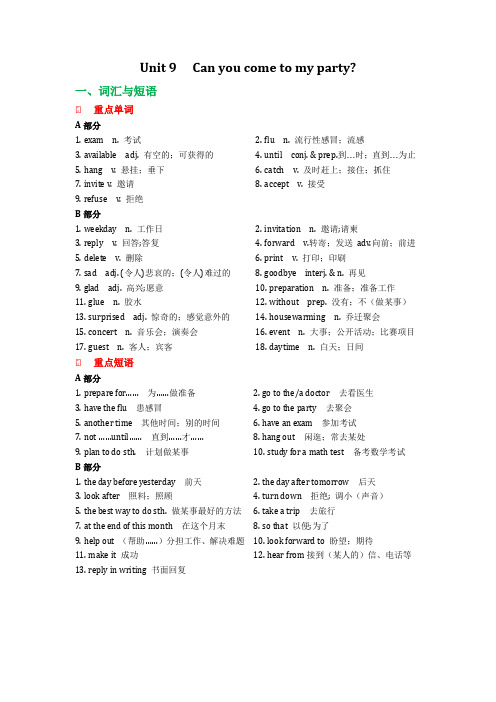
Unit 9 Can you come to my party?一、词汇与短语● 重点单词A部分1.exam n. 考试2.flu n. 流行性感冒;流感3.available adj. 有空的;可获得的4.until conj. & prep.到…时;直到…为止5.hang v. 悬挂;垂下6.catch v. 及时赶上;接住;抓住7.invite v. 邀请8.accept v. 接受9.refuse v. 拒绝B部分1.weekday n. 工作日2.invitation n. 邀请;请柬3.reply v. 回答;答复4.forward v.转寄;发送adv.向前;前进5.delete v. 删除6.print v. 打印;印刷7.sad adj. (令人)悲哀的;(令人)难过的8.goodbye interj. & n. 再见9.glad adj. 高兴;愿意10.preparation n. 准备;准备工作11.glue n. 胶水12.without prep. 没有;不(做某事)13.surprised adj. 惊奇的;感觉意外的14.housewarming n. 乔迁聚会15.concert n. 音乐会;演奏会16.event n. 大事;公开活动;比赛项目17.guest n. 客人;宾客18.daytime n. 白天;日间● 重点短语A部分1.prepare for…… 为……做准备2.go to the/a doctor 去看医生3.have the flu 患感冒4.go to the party 去聚会5.another time 其他时间;别的时间6.have an exam 参加考试7.not ……until…… 直到……才……8.hang out 闲逛;常去某处9.plan to do sth. 计划做某事10.study for a math test 备考数学考试B部分1.the day before yesterday 前天2.the day after tomorrow 后天3.look after 照料;照顾4.turn down 拒绝; 调小(声音)5.the best way to do sth. 做某事最好的方法6.take a trip 去旅行7.at the end of this month 在这个月末8.so that 以便;为了9.help out (帮助……)分担工作、解决难题10.look forward to 盼望;期待11.make it 成功12.hear from接到(某人的)信、电话等13.reply in writing 书面回复● 重点句子A部分1.--Can you come to my party on Saturday? --Sure, I'd love to.--周六你能来参加我的聚会吗?--当然,我想来。
人教版八年级上册第九单元的知识点
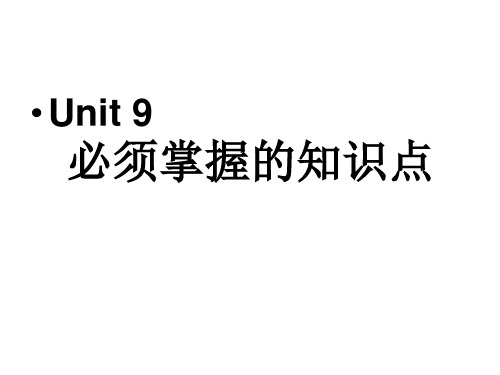
4. 他打嗝打了多长时间? 他打了69年零5个月。
How long did he hiccup? He hiccupped for sixty-nine years and five months.
5. 任何时候开始做事都不会嫌早
You are never too young to start doing things.
1.他何时出生的? When was he born(出生)? 他生于2008年。
He was born in 2008. 他生于1995年2月。 He was born in February, 1995. 他生于1987年3月27日。
He was born on March 27th, 1987.
hold/have the world record for hiccupping =keep the world record for
hiccupping
5.停止做某事 stop doing
停下来去做 stop to do
6. 太而不能 too …to 对于某人来说太而不能做某事 too … for sb. to do
7. 十个月大 ten months old
8.为他的国家队效力 play for his national team
9.一个国际运动员 an international athlete
10.与某人一起度过了所有的业余时间
spend all one’s free time with sb.
11.著名的小提琴手
My daughter is too young to dress herself. My daughter isn’t old enough to dress herself. My daughter is so young that she can’t dress herself.
人教版英语八年级上册第九单元Unit9-词组句型作文知识点整理

Invitation
Dear Peter,
I’m going to have my fourteenth birthday party at my house on Nanjing Street. I think it would be great if you can join us. The party is going to last(持续) from 2:30pm to 5:00 on Friday. You can take the No.6 or No.12 bus here. John is going to come. I think you must be happy to meet him. If you can’t find my house, please call me at 852396.
40. by在本单元中是“截止到…为止” 41. go back to 回到 42. have a party for sb 为某人举办派对 43. help with sth 帮助做某事=help to do sth 44. think of 考虑,认为 45. games to play 玩的游戏
I’m really sorry. I will visit you when my mother is at home. Here I say “Happy birthday to you!”
Yours
Jenny
谢谢你的邀请。我很抱歉我不能去你的生日派对。星期天我没有空。我的妈妈在星期日不得 不去上班。并且我不得不在家照顾我的小妹妹因为她太小了。并且我也需要为她准备食物。 我真的很抱歉。当我妈妈在家的时候我将会去看望你。在这里我说“生日快乐”
最全面人教版八年级上册英语第九单元知识点归纳总结

Unit 9 Can you come to my party?一、词汇与短语● 重点单词A部分1.exam n. 考试2.flu n. 流行性感冒;流感3.available adj. 有空的;可获得的4.until conj. & prep.到…时;直到…为止5.hang v. 悬挂;垂下6.catch v. 及时赶上;接住;抓住7.invite v. 邀请8.accept v. 接受9.refuse v. 拒绝B部分1.weekday n. 工作日2.invitation n. 邀请;请柬3.reply v. 回答;答复4.forward v.转寄;发送adv.向前;前进5.delete v. 删除6.print v. 打印;印刷7.sad adj. (令人)悲哀的;(令人)难过的8.goodbye interj. & n. 再见9.glad adj. 高兴;愿意10.preparation n. 准备;准备工作11.glue n. 胶水12.without prep. 没有;不(做某事)13.surprised adj. 惊奇的;感觉意外的14.housewarming n. 乔迁聚会15.concert n. 音乐会;演奏会16.event n. 大事;公开活动;比赛项目17.guest n. 客人;宾客18.daytime n. 白天;日间● 重点短语A部分1.prepare for…… 为……做准备2.go to the/a doctor 去看医生3.have the flu 患感冒4.go to the party 去聚会5.another time 其他时间;别的时间6.have an exam 参加考试7.not ……until…… 直到……才……8.hang out 闲逛;常去某处9.plan to do sth. 计划做某事10.study for a math test 备考数学考试B部分1.the day before yesterday 前天2.the day after tomorrow 后天3.look after 照料;照顾4.turn down 拒绝; 调小(声音)5.the best way to do sth. 做某事最好的方法6.take a trip 去旅行7.at the end of this month 在这个月末8.so that 以便;为了9.help out (帮助……)分担工作、解决难题10.look forward to 盼望;期待11.make it 成功12.hear from接到(某人的)信、电话等13.reply in writing 书面回复● 重点句子A部分1.--Can you come to my party on Saturday? --Sure, I'd love to.--周六你能来参加我的聚会吗?--当然,我想来。
人教版八年级上册第九单元知识点全八上unit9知识点
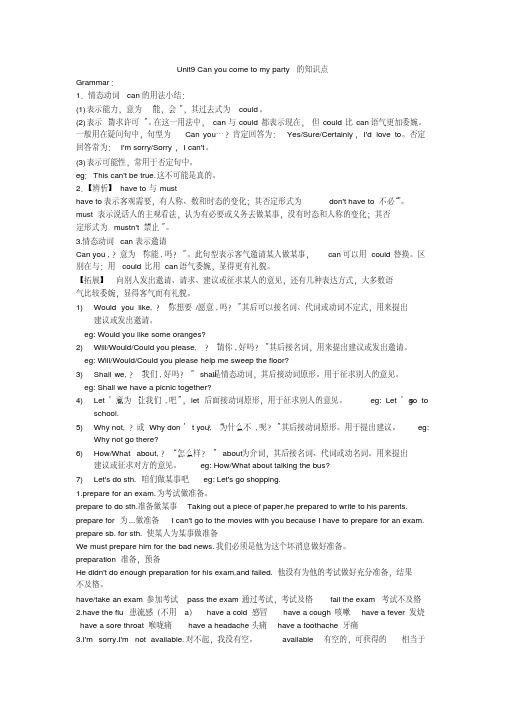
Unit9 Can you come to my party的知识点Grammar:1.情态动词can的用法小结:(1)表示能力,意为“能,会”,其过去式为could。
(2)表示“请求许可”。
在这一用法中,can与could都表示现在,但could比can语气更加委婉。
一般用在疑问句中,句型为Can you…?肯定回答为:Yes/Sure/Certainly,I'd love to。
否定回答常为:I'm sorry/Sorry,I can't。
(3)表示可能性,常用于否定句中。
eg:This can't be true.这不可能是真的。
2.【辨析】have to与must不必”。
have to表示客观需要,有人称、数和时态的变化;其否定形式为don't have to“must表示说话人的主观看法,认为有必要或义务去做某事,没有时态和人称的变化;其否定形式为mustn't“禁止”。
3.情态动词can表示邀请Can you ,?意为“你能,吗?”。
此句型表示客气邀请某人做某事,can可以用could替换。
区别在与:用could比用can语气委婉,显得更有礼貌。
【拓展】向别人发出邀请、请求、建议或征求某人的意见,还有几种表达方式,大多数语气比较委婉,显得客气而有礼貌。
1)Would you like,?“你想要/愿意,吗?”其后可以接名词、代词或动词不定式,用来提出建议或发出邀请。
eg: Would you like some oranges?2)Will/Would/Could you please,?“请你,好吗?”其后接名词,用来提出建议或发出邀请。
eg: Will/Would/Could you please help me sweep the floor?3)Shall we,?“我们,好吗?”shall是情态动词,其后接动词原形。
用于征求别人的意见。
人教版八年级上册unit9全部知识点
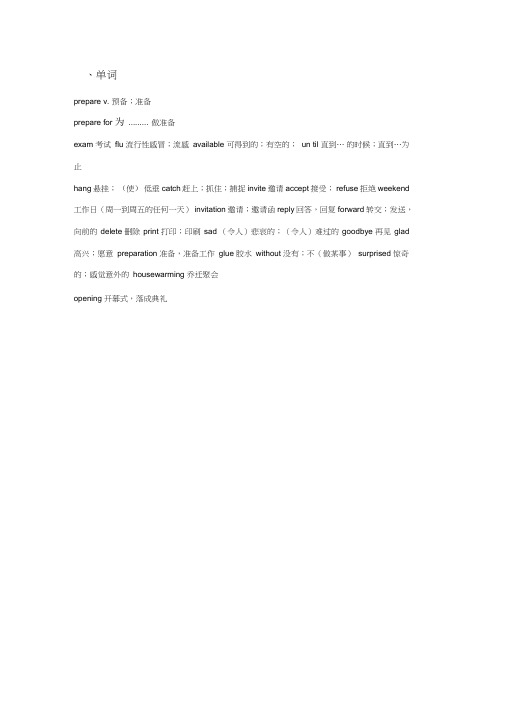
、单词prepare v. 预备;准备prepare for 为 ......... 做准备exam 考试flu 流行性感冒;流感available 可得到的;有空的;un til 直到… 的时候;直到…为止hang 悬挂;(使)低垂catch 赶上;抓住;捕捉invite 邀请accept 接受;refuse 拒绝weekend 工作日(周一到周五的任何一天)invitation 邀请;邀请函reply 回答,回复forward 转交;发送,向前的delete 删除print 打印;印刷sad (令人)悲哀的;(令人)难过的goodbye 再见glad 高兴;愿意preparation 准备,准备工作glue 胶水without 没有;不(做某事)surprised 惊奇的;感觉意外的housewarming 乔迁聚会opening 开幕式,落成典礼concert 音乐会headmaster 校长event 大事,公开活动guest 客人calendar 日历,日程表Daytime 白天;日间Ted 特德(男名)May 梅(女名)Vince 文斯(男名)Steen 斯蒂恩(姓)Jake 杰克(男名)Susan 苏珊(女名)重点单词1 invite v. 邀请♦i nvite sb. to sth. 意为"邀请某人加..... ;邀请某人到 ... ”。
如:I ' m going to invite my friends to my party this Sunday.♦invite sb. to do sth. 意为“邀请某人做某事”。
如:The young man invited me to sing just now.【链接】invite 的名词形式是invitation 。
与invitation 相关的短语有:make an invitation 发出邀请accept an invitation 接受邀请turn down / refuse an invitation 拒绝邀请2 refuse v. 拒绝不及物动词:I don ' t know if Lily will refuse.advice.refuse 还可用作及物动词。
- 1、下载文档前请自行甄别文档内容的完整性,平台不提供额外的编辑、内容补充、找答案等附加服务。
- 2、"仅部分预览"的文档,不可在线预览部分如存在完整性等问题,可反馈申请退款(可完整预览的文档不适用该条件!)。
- 3、如文档侵犯您的权益,请联系客服反馈,我们会尽快为您处理(人工客服工作时间:9:00-18:30)。
Unit9 Can you come to my party 的知识点Grammar :1.情态动词 can 的用法小结:(1)表示能力,意为“能,会”,其过去式为 could 。
(2)表示“请求许可”。
在这一用法中, can 与 could 都表示现在,但 could 比 can 语气更加委婉。
一般用在疑问句中,句型为 Can you⋯?肯定回答为: Yes/Sure/Certainly ,I'd love to。
否定回答常为: I'm sorry/Sorry , I can't。
(3)表示可能性,常用于否定句中。
eg: This can't be true.这不可能是真的。
2.【辨析】 have to 与 musthave to 表示客观需要,有人称、数和时态的变化;其否定形式为don't have to 不必“”。
must 表示说话人的主观看法,认为有必要或义务去做某事,没有时态和人称的变化;其否定形式为 mustn't “止禁”。
3.情态动词can 表示邀请Can you , ?意为“你能 , 吗?”。
此句型表示客气邀请某人做某事,别在与:用 could 比用 can 语气委婉,显得更有礼貌。
can 可以用could替换。
区【拓展】向别人发出邀请、请求、建议或征求某人的意见,还有几种表达方式,大多数语气比较委婉,显得客气而有礼貌。
1)Would you like, ?“你想要 /愿意 , 吗?”其后可以接名词、代词或动词不定式,用来提出建议或发出邀请。
eg: Would you like some oranges?2)Will/Would/Could you please, ?“请你 , 好吗?”其后接名词,用来提出建议或发出邀请。
eg: Will/Would/Could you please help me sweep the floor?3)Shall we, ?“我们 , 好吗?” shall是情态动词,其后接动词原形。
用于征求别人的意见。
eg: Shall we have a picnic together?4) Let ’意s,为“让我们 , 吧”, let 后面接动词原形,用于征求别人的意见。
eg:Let ’gos to school.5)Why not, ?或 Why don ’ t you,?“为什么不 , 呢?”其后接动词原形。
用于提出建议。
eg:Why not go there?6)How/What about, ?“,怎么样?” about为介词,其后接名词、代词或动名词。
用来提出建议或征求对方的意见。
eg: How/What about talking the bus?7)Let's do sth. 咱们做某事吧eg: Let's go shopping.1.prepare for an exam.为考试做准备。
prepare to do sth.准备做某事 Taking out a piece of paper,he prepared to write tohis parents. prepare for 为 ...做准备 I can't go to the movies with you because Ihave to prepare for an exam. prepare sb. for sth. 使某人为某事做准备We must prepare him for the bad news. 我们必须是他为这个坏消息做好准备。
preparation 准备,预备He didn't do enough preparation for his exam,and failed. 他没有为他的考试做好充分准备,结果不及格。
have/take an exam 参加考试pass the exam 通过考试,考试及格fail the exam 考试不及格2.have the flu 患流感(不用a)have a cold 感冒have a cough 咳嗽 have a fever 发烧have a sore throat 喉咙痛have a headache 头痛 have a toothache 牙痛3.I'm sorry.I'm not available. 对不起,我没有空。
available 有空的,可获得的相当于free=have time4.Oh, but Sam isn't leaving until next Wednesday. 哦,但是萨姆一直待到下周三才会离开。
until 作介词,“到 ...时;直到 ...为止”表示动作、状态的继续,相当于till 。
until 常用于否定句中,与 not 构成固定结构,n ot...until, “直到 ....才”I waited until three o'clock . 我一直等到三点钟。
The noise didn't stop until midnight. 嗓音一直到午夜才停止。
until 还可用作连词,表动作、状态持续到另一动作或状态出现之前,意为“直到...为止”He lived with his parents until got married. 他和她的父母住在一起直到结婚。
The children won't come home until it is dark. 孩子们直到天黑才会回家。
5.Can you hang out with us on Monday night? 周一晚上你能和我们一起逛街吗?hang out 闲逛;常去某处hang out sp.hang on 紧紧抓住hang about (在某处)闲荡hang up 挂断电话,悬挂,挂起hang 悬挂,垂下过去式为 hung (被)吊死,(被)绞死过去式为 hanged6.Catch you on Monday. 周一见。
Catch you 常用于口语,类似的有see you later!Catch a cold 患感冒catch one's eye 引起某人的注意catch the train 赶上火车Catch up with 赶上,跟上catch hold of 抓住7.I'm afraid not. 恐怕不能。
I'm afraid so. 恐怕如此。
I hope so. I hope not. I think so. I don't think so.8.invite sb. to + 地点名词邀请某人去某地invite sb. to do sth. 邀请某人做某事invite 名词invitation 邀请,请柬9.accept 接受refuse 拒绝accept 接受,指主观上愿意接受receive 收到,指客观上收到或拿到,但主观上不一定会接受。
I received his gift yesterday , but I wouldn't like to accept it. 昨天我收到了他的礼物,但我不想接受它。
refuse 后接名词、代词或动词不定式不接He usually refuses the invitation from Tonying。
他通常会拒绝托尼的邀请。
Section B 知识点1.the day before yesterday 前天用于一般过去时He went to Beijing the day before yesterday.the day after tomorrow 后天用于一般将来时2.weekday 工作日从星期一到星期五的任何一天weekend 周末指星期六和星期日在周末on weekends on the weekendI only work on weekdays , not on weekends.3.What's today? 今天是什么日子?回答时,通常用星期和日期,也可用节日。
如It's Monday the 14th. 今天是 14 号,星期一。
It's Teacher's Day.今天是教师节。
What's the date today? 今天是几月几号?回答用日期。
It's September 10th .9 月 10 号。
What day is it today ?今天是星期几?回答用星期It's Monday. 星期一。
4.Look after his sister. 照顾他的妹妹。
Look after =take care of look after ...well =take good care of ...You should look after the dog well.=You should take good care of the dog. 你应该好好照顾这条狗。
look at 看look for 寻找look forward to doing 盼望,期待5.turn down an invitation 拒绝邀请turn down 拒绝;关小;调低当拒绝讲时相当于refuse lookout当心,小心turn up 开大;调高动副结构,代词作宾语放在中间6.She helped me to improve my English so much. 他帮助我把英语提高了那么多。
so much 如此多,可修饰动词作状语,后面也可接不可数名词。
Thank you so much.There was so much noise outside.外面噪杂声很多。
区分 so many7.I'm sad to see her go, and this party is the best way to say “ Thank you and goodbye.”看到她离开我很难过,这个聚会是她说“谢谢和再见”的最好方式。
1 ) sad 形容词,“令人悲哀的;令人难过的”sadness 名词,“悲伤,悲痛”2) see sb. do sth. see sb. doing sth. 的区别8.My family is taking a trip to Wuhan at the end of this month to visit my aunt and uncle. 在这个月末,我们全家打算去武汉旅行,看望我的叔叔和婶婶。
take a trip 去旅行at the beginning of 在 ...的开始at the end ofby the end of 在 ...末尾,在 ...尽头可以表示地点,也可以表示时间。
